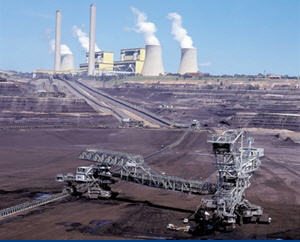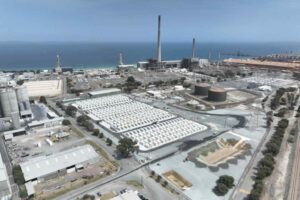Greens leader Christine Milne has called on Australia to commit to being “net carbon zero” by 2050, and commit to cutting emissions by up to 60 per cent by 2030.
In a speech at the National Press Club in Canberra, Milne has also suggested that Australia introduce emissions standards to ensure the phasing out of excess coal fired power stations – as the US and China has done, and says Australia should aim to reach 100 per cent renewable energy as soon as it can.
The proposal for emissions standards on coal plan is interesting, given that Labor had proposed a limit of 0.86 tonnes of coal per MWh, before dropping that plan when the carbon price was introduced.
The Greens believe that such a standard – although they have not yet nominated a figure – could force the exit of coal-fired generators, rather than making taxpayer-funder payments as the likes of AGL Energy are now demanding – to help pay for up to $300 million per facility for “remediation” costs.
 “We’ve never had a better opportunity to phase out coal,” Milne said in response to a question after the speech. She noted that this could be achieved through standards, or through a timed phase-out. She noted that the coal industry had been offered an opportunity to receive payments, but this moment had passed.
“We’ve never had a better opportunity to phase out coal,” Milne said in response to a question after the speech. She noted that this could be achieved through standards, or through a timed phase-out. She noted that the coal industry had been offered an opportunity to receive payments, but this moment had passed.
Milne says it was clear from the science that the impacts of climate change were accelerating, and that the world was moving towards some sort of agreement in Paris next year to meet the commitment to cap average global warming to 2C.
That, according to the Climate Change Authority, would require Australia to commit to a reduction target of 30-40 per cent by 2025 (it’s current target is a 5 per cent reduction by 2020), and would mean Australia would have a carbon “budget” that could be exhausted within 16 years. Australia will be asked to commit to new targets in the lead up to those Paris talks.
Milne says she thinks that the CCA is being conservative, and Australia should have a higher target, of between 40 and 60 per cent by 2030.
“The (CCA’s recommendation) is so far away from the Liberals, Labor and Palmer 5 per cent level of ambition that it is laughable,” Milne said.
“I believe that Australia should put on the table for the 2015 negotiations a trajectory of 40 to 60 per cent below 2000 levels by 2030 and net carbon zero by 2050. This is the reality of the task ahead. This is our climate reality. Doing what is necessary is not radical, it is prudent. “
Milne call for more for a more ambitious target comes as 350 of the largest institutional investors representing $26 trillion of funds prepare to call for an upscaling of climate action at a function hosted by the UN and the World Bank in the US on Friday. This will include calls for a carbon price in more countries.
“We have a competitive and comparable advantage” in solar and other renewables, Milne said, urging that the renewable energy target had to be protected, and scaled up.
Australia has just dumped its carbon price, just two years after implementing it. Milne conceded that the debate in Australia over carbon had been derailed by its focus on a price (the Greens had insisted on a fixed period starting at $23/tonne), rather than about a “vision for the future” and the benefits of R&D, new technologies, jobs, investment, clean energy, and clean air that a carbon price would bring.
“It’s no longer a question of ‘if’ and ‘when’, it’s now a question of now or never,” Milne said in her speech.
“The Australian Greens know what is at stake in facing global warming. We have the courage to say what needs to be said, and provide hope for our future, and the Government and those who support it, focus on the past and give people nothing but despair.”
Milne said that Australia has all the resources and talents necessary to transform our society to an innovative, jobs rich, clean energy future.
“We have never specified long range goals on an urgent time schedule, or managed our resources and our time so as to ensure their fulfilment” said JFK , we could do it with a clean energy future.
“And if we did, it would be our entire nation that would benefit from the best possible positioning environmentally, socially, economically and diplomatically in a world rapidly shifting to a carbon constrained future.
Why wouldn’t we give it a go? As Ban Ki-moon has said “Instead of asking if we can afford to act, we should be asking what is stopping us, who is stopping us, and why?”
Milne said the biggest impediments were a Coalition government, led by Tony Abbott, that was “governing for business”.
His policies had indirectly destroyed jobs and investment in carbon farming initiatives, his position on the RET had effectively destroyed large scale investment, and he had ended th carbon price, and tried to close the CCA, the Clean Energy Finance Corp, and the Australian Renewable Energy Agency.
“Time is running out and the rising seas are coming in. The tide of public opinion is behind strong action. The shift to renewables and away from fossil fuels is on. No new coal mines, no extensions of existing mines and no new coal export terminals.
“It means no more CSG and no more pretence that gas is a transitional fuel. Australia must hit 100% renewables as soon as possible.
“It means a federal independent commission against corruption so the revolving door of politics and business is jammed. The relationship between mining approvals and brown paper bags must be shattered. Winning on the climate depends on it.”








